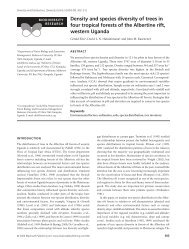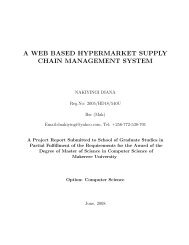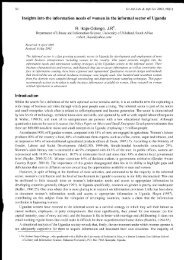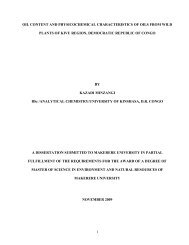THE UNIVERSITY OF LEIPZIG
THE UNIVERSITY OF LEIPZIG
THE UNIVERSITY OF LEIPZIG
You also want an ePaper? Increase the reach of your titles
YUMPU automatically turns print PDFs into web optimized ePapers that Google loves.
We shall use the term participation in following the sense of Donnelly-Roark. Participation as<br />
a concept is used to mean power-sharing in decision-making. Participation must include real<br />
devolution of significant powers. Despite its problematic nature, we use the term community<br />
to mean a well dissected area of a geographically specified local population. 409 The concept of<br />
participation waded through the third World at the dawn of the 1990s. This was after the state<br />
weathered from a progressive force of change and modernisation to a backward, primordial<br />
arena of neo-patrimonialism, dictatorship, corruption and greed, hindering far reaching<br />
development. 410<br />
Therefore, when we talk of local decentralisation and local particiapation in natural resource<br />
usage, we drift away from the earlier notion of people and local communities being perceived<br />
as bad environmental managers or natural resource villains. 411 We also tactfully move away<br />
from Hardin’s tragedy of commons where communities are perceived to take part in<br />
destroying nature through ignorance selfishness and greed. 412 But we are rather moving to a<br />
dimension where people – environmental relationship is central. We look at people, their local<br />
knowledge and affinity with nature as strong drivers to save the earth's threatened biological<br />
resources. 413 Local decentralisation and participatory approaches to environment and<br />
development received a great boost from the state-society oscillation. The two notions<br />
emerged from a long history of distress, characterised by failed and frustrating top-down<br />
approaches. This “new” phenomenon which is largely a product of social movements notion<br />
of biodiversity, centered on indigenous rights, anti-statist sentiments of both the left and the<br />
right, structural adjustment agendas and fiscal cries of post-Cold War Third World states. 414<br />
Local participatory development has become a means to incorporate civil society into the<br />
decisions formerly reserved for state policy elites. Now that the heavy weight of the state is<br />
sowly weathering away, decentralisation and local decision-making are inadvertently seen as<br />
routes by which control is being transferred from one power centre to another. The process<br />
entails local accountability, decision-making, benefit sharing, transfer of discretionary powers<br />
as well as local legislation and legal framing, to which we now turn.<br />
It was found out that many programs in Kakamega district approach local resource users<br />
groups such as woodcutters, pastoralists, farmers, women's or youth associations as a way of<br />
enlisting local participation in form of legislation and legal framing. These groups, however,<br />
409<br />
Donnelly-Roark, P. 1997. Reinventing Decentralisation Burkinabe Style: progress and Strategy notes'.<br />
Mimeo.<br />
410<br />
Ferguson, J. 1998. Transnational Topographies of Power: Beyond "the State" and "Civil Society" in the<br />
Study of African politics'.Draft Mimeo: Department of Anthropology, University of California.<br />
411<br />
Ehrlich, P.R. 1978. The Population Bomb. New York: Ballantine Books.<br />
412<br />
Banuri,T, and F. A, Margolin. 1993. Who will Save the Forests? Knowledge, Power and Environmental<br />
Destruction. London: Zed Books.<br />
413<br />
Downs, R. E., and Reyna, S. P. 1988. Land and Society in Contemporary Africa. Hanover: University Press<br />
of New England.<br />
414<br />
Rasmussen, T. 1986. The Green Revolution in the Southern Highlands. In Tanzania: Crisis and Struggle For<br />
survival, edited by J. Boesen, K. Havnevik, J. Koponen, and R. Odgaard, 191-205. Uppsala: Scandinavian<br />
Institute of African Studies.<br />
85






